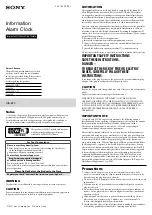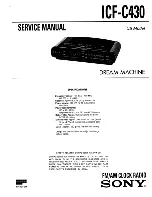
30309459
Issue 1.06
Features
Fault self-diagnostic.
A magnet test available.
Providing for connections to remote indicators.
Built-in microprocessor stores 14 history data.
Polling LED can be set to OFF.
Standard: UL268.
Description
DI-M9102 Intelligent Photoelectric Smoke Detector (the detector)
can form fire alarm system connecting with a fire alarm control panel
(FACP). The detector illuminates indicators to indicate fire condition
and transmits alarm signals to the FACP.
Using infrared scattering technology, with an innovative chamber,
the detector receives very weak infrared light under the normal
clean environment. If smoke particles enter the chamber, the
received light signal will be increased by scattering. When smoke
density reaches a certain amount, the detector will give alarm
signals. In order to reduce interference and power consumption, the
emitting circuit works in pulse mode to prolong the life of IR emitting
diode..
Connection and Cabling
The orientation base of DB-M01 is shown in Fig. 2.
5
45
75
Cable Entry
Mounting
Hole
Fig. 1 Fig. 2
Please install the base according to following steps:
1)
Locate mounting holes on the rubber layer of the base
according to the holes on the back box, and punch the holes
with a screwdriver.
2)
Count the number of cables needed and punch correct
quantity of holes with a screwdriver on the rubber layer.
Thread the cables through the cable entry holes.
3)
Install the base onto the back box with screws.
Warning: Do not punch mounting holes and cable entry holes
bigger than needed. Do not punch more holes than needed.
Used together with UL certified GST-M200 control panel, loop of the
control panel should be connected with
terminals “1” and “3” of the
base, polarity-insensitive; terminals
“2” to anode of remote indicator
and
“4” to the cathode. System connection is shown in Fig 3.
Remote Indicator
-
+
LOOP OUT
Addressable Detector
Remote Indicator
Addressable Detector
+
-
LOOP IN
Fig. 3
Recommended Wiring
1.0mm
2
or above fire cable for all, laid out through metal conduit or
flame-resistant conduit, subject to local codes. The connection of
remote indicator should use different color cables to distinct polarity.
Installation
Refer to
D Series Detector Application Bulletin
for additional
installation instructions
.
Fix the base with two taping screws. Then align A (Fig. 1) on the
bottom of the detector to B (Fig. 2) of the base, and rotate the
detector clockwise to mark C. Mounting of the detector is shown in
Fig. 3.
54.5mm
Electrical Box
Conduit
Base
Detector
Fig. 4
Application
The polling LED is Normal by default, which can be modified to OFF
state using P-9910B programmer changes sensitivity of the
detector.
Program sensitivity: In power-on state, input unlocking password
and press
Clear
to unlock. Press
Function
, then press “3”, the
screen shows “-” at the last digit. Input corresponding parameter of
the detector and press
Program
, the screen will show a “P”, the
parameter is programmed successfully. Press
Clear
to clear the "P".
Input locking password and press
Clear
to return.
Detectors Setup
Input Parameter of a Detector
Status of Polling LED
1
Normal
129
OFF
Read sensitivity: On power-on time, press
Test
, the LCD screen
shows the address of the detector; Press
Up
, it shows in turn the
sensitivity level, device type, initial sensitivity.
Testing
Before testing, please ensure that the detector has been
installed correctly and powered up. After 10 seconds, testing
can begin.
Before testing, notify the proper authorities that the system is
undergoing maintenance and will temporarily be out of service.
Disable the zone or system undergoing maintenance to avoid
unwanted alarms.
All detectors must be tested after installation and periodically
thereafter. Testing methods must satisfy the Authority Having
Jurisdiction (AHJ). Detectors offer maximum performance when
tested and maintained in compliance with NFPA 72. The detector
can be tested in the following way:
1)
Magnet test
Magnetic test zone is shown in Fig.5. Put the magnet of commission
tool close to the zone of the detector and hold on for a few seconds
DI-M9102 Intelligent
Photoelectric Smoke Detector




















